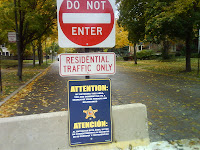Monday, March 29, 2010
Shedding Light on Night
Wednesday, February 10, 2010
WHO DAT? Blogging the 2010 Super Bowl Ads

At approximately 3 p.m. on Sunday, Feb. 2, I sat down to watch my very first Super Bowl.
Monday, January 4, 2010
The Junior's Guide to College: 2010 Edition
Q&A With Private College Counselor Frona Kahn
Between AP classes, SATs, and watching frantic seniors submit college applications, navigating the pitfalls of junior year can be tricky. Professional college counselor Frona Kahn answered some of the most pressing questions.
Q: Is it true that now universities want "angular" kids (i.e. extremely involved and successful in one activity) rather than "bright, well-rounded" kids?
A: In general terms, private colleges are looking for students who are more "angular." However, if you are applying to the Ivies, you need depth and success in two major areas.
I'd approach this from another angle as well--why do colleges want this? First, they want to see that a student goes way "beyond" the normal involvement, is self-motivated, and strives for excellence. Secondly, colleges want to know that students will be key contributors on campus. For instance, high school students involved in math may participate in the Putnam Competition in college. Admission officers don't want to see "resume fillers", they want to see leadership and passion. Show initiative and be able to differentiate yourself from other students.
Q: Should juniors send their SAT scores to colleges?
A: If you have scores well above the top scorers granted admission during the prior year and are interested in a specific college, you can certainly send them. However, there are many other ways to get noticed by college admission officers.
Q: Any tips for doing well on the essay portion of the SAT?
A: It is a formulaic essay. If you have good knowledge of 5-10 key figures, leaders, and changemakers from history, you can probably adapt whatever question you get to fit that knowledge. Make sure you give strong examples. Practice using the rubric and ask and an English teacher to give you feedback, if possible. Make sure you read the prompt carefully and answer it.
Q: How many SAT Subject tests should students take? How should we choose which ones to take?
A: Choose tests where you feel you can be most successful. Get a practice test book and take a couple of tests.
I generally recommend that students take 3-4 subject tests and use the highest scores. It's helpful if you don't have to take all the tests on one day. That said, you usually want to wait till the end of the year in which you are studying the subject to take the test.
If you are heading towards the math and science area, you want to show proficiency in those areas. For instance, my eldest son, who is getting his Ph.D in theoretical physics at MIT, took the SAT 2 Physics test. As in most standardized tests, practice helps, and reflecting on your answers right after you finish a practice test can also be beneficial.
 What advice would you give to juniors in general?
What advice would you give to juniors in general?Try to take the long view on this process. I've found that there's a great deal of maturation and change that goes on between the time that you apply for college (next fall) and the time you send in your housing deposit (next spring).
On choosing the right college: Look for and apply to a school that fits you. Schools have personalities, and you are in this process not just to get accepted, but to be happy, meet friends, learn and flourish. The school that "fits" you may surprise you--be open to many different kinds of colleges, because undergrad is just one step in your educational process. Many of you will go onto graduate school. And look outside the US if that works with your family; for instance, one of my sons is studying at McGill in Montreal, Canada.
On college visits: Know why you are applying to the colleges on your list. Visit during spring break if possible and plan your visit well. Connect with professors and students in departments of interest. Share your interests with them and ask lots of questions. The right preparation for a college visit can help you write a stronger essay of "why" you want this particular school -- and that counts with admissions. Learn how to be successful in admission and alum interviews and present yourself as a strong candidate.
On preparing for applications: Look at the common application online and the various supplements needed for different privates. See what is asked. Don't start on the applications now, but know what's coming up.
One of our students actually said that filling out apps was fun. She followed her passions, which were music and language. She became the student choir director at her high school and helped mentor younger students, select repertoire, and conduct the ensembles. By the time she reached the application season, despite all the SAT stress, she had a lot to say about herself, and where she wanted to study and why.
On resumés: Start working on your resume during the next break. Keep adding to it monthly/quarterly. It will be much easier to fill out college applications with an organized list.
On internships: During this next semester and summer, seek to deepen your involvement in outside activities. Internships are important. One of our students was accepted as a fashion design intern in NYC two summers in a row and worked with several big name firms. But it took her 300 letters, countless phone calls, resumes, portfolios and interviews to secure her first internship. Another student interned in the Genetics Counseling Department at Stanford--again, it took tremendous work, effort and initiative to make this happen.
On working: Admissions officers love students who have paying jobs. They like the commitment this shows. A summer job can be helpful experience without getting in the way of schoolwork.
On financial aid: Many parents and students ask me how to get scholarships to pay for college. When we develop lists for students, we include colleges that we know will give merit-based aid (not based on income level, but on accomplishments). One of the students we worked with is now at a private college on a large 4 year renewable merit scholarship. It can be done!
On leadership: Look for opportunities to develop leadership skills. It will help you on your applications and it also helps others. Admissions officers are interested in seeing that you care about helping the community.
On Ivy League pressure: Realize that some Ivies accept only 7-10% of students that apply. That means they turn down 93-90%. I firmly believe, and this is reflected in our practice with hundreds of students, that it’s possible to get into top grad schools if you have done extraordinarily well in your undergraduate programs (at non-Ivies).
Grades do matter, of course, and taking the most challenging academic load, however, please, please try to stay balanced. Easier said than done, but it is possible.

Know that all of you will get into wonderful colleges and universities. Relish the journey. Ask questions, and trust your instincts. Best of luck to all of you.
Frona Kahn is the president of DesignWorlds for College and an experienced college counselor. She has two sons who currently studying at MIT and McGill.
Thursday, December 31, 2009
In the Year 2009
 After several weeks' silence on this blog, I figured it was only fitting to finish off the decade with a multimedia feature.
After several weeks' silence on this blog, I figured it was only fitting to finish off the decade with a multimedia feature.
| A MIDEAST BOND, STITCHED BY PAIN AND HEALING |
JERUSALEM — He can be impulsive. She has a touch of bossiness. Next-door neighbors for nearly a year, they talk, watch television and explore the world together, wandering into each other’s homes without a second thought. She likes his mother’s eggplant dish. He likes her father’s rice and lamb.
Friendship often starts with proximity, but Orel and Marya, both 8, have been thrust together in a way few elsewhere have. Their playground is a hospital corridor. He is an Israeli Jew severely wounded by a Hamas rocket. She is a Palestinian Muslim from Gaza paralyzed by an Israeli missile. Someone forgot to tell them that they are enemies.
Read the rest of the article here.
Happy New Year! Best wishes for a peaceful decade.
Wednesday, October 28, 2009
Journey to the Sacred Homeland

Pilgrimage is a pillar of all three major world religions. Although prayer is possible from anywhere in the world, physical travel to sacred monuments allows for a tangible connection to the history of belief.
I had the privilege to travel to such a monument. It is perhaps not as well known as the Wailing Wall, the Dome of the Rock, or the Vatican, but it shares a beautiful location, extensive security, and famous inhabitants.
It’s Barack Obama’s house in Hyde Park, Chicago.
The leafy neighborhood of Hyde Park has wide, quiet streets and dignified craftsman and colonial houses. Concrete blockades and signs at the entrance to Obama’s street inform visitors that “by entering this area, you are consenting to a search of your person and belongings,” but pedestrian access to the street is otherwise unimpaired.
The Obamas’ modest house stands across the street from a brick synagogue, Temple KAM Isaiah Israel. The synagogue’s intriguing architecture includes a domed roof and a towering minaret, congruent with the Moorish style of the synagogue’s sanctuary.
During the 2008 presidential campaign, the synagogue endured stringent security measures, according to Executive Director Tal Rosen.
“If someone was coming to the synagogue, they had to wait at the checkpoint and have the Secret Service call in and confirm that they were going to the synagogue, and then we had to go out and meet them,” Rosen said. “It was a hassle, but it does make you feel safe.”
Secret Service agents on duty at the President’s house do inform passersby that unless they are headed to the synagogue, they should not be on the road. However, this policy does not seem to be incredibly strictly enforced.
The two agents on duty at the time were quite amiable. One of them, an officer in the Chicago Police Force, told us he used to be an attorney. When my 10-year-old brother said that he thought it would be cool to be a Secret Service agent, the officer advised him to “stay out of trouble, do well in school, and don’t do drugs. It’s an important job.” Then he gave my brother a Secret Service lapel pin and posed for a picture.
Yes, even Obama’s home security agents are chill.
And the coolest thing is that the house next door is for sale.
Saturday, October 17, 2009
Oktoberfest
 Everything seems to happen in October: fall sports, choir concerts, new seasons of TV shows, college apps, APUSH projects, APUSH tests, College Awareness Day, PSATs, SATs, Nobel Peace Prizes, 6-year-old boys not actually floating away in balloons, and – just today – the Malaysian government's underwater meeting to protest climate change. Plus five million other things.
Everything seems to happen in October: fall sports, choir concerts, new seasons of TV shows, college apps, APUSH projects, APUSH tests, College Awareness Day, PSATs, SATs, Nobel Peace Prizes, 6-year-old boys not actually floating away in balloons, and – just today – the Malaysian government's underwater meeting to protest climate change. Plus five million other things.Tuesday, September 22, 2009
Halloween: Too Old to Trick-or-Treat?




